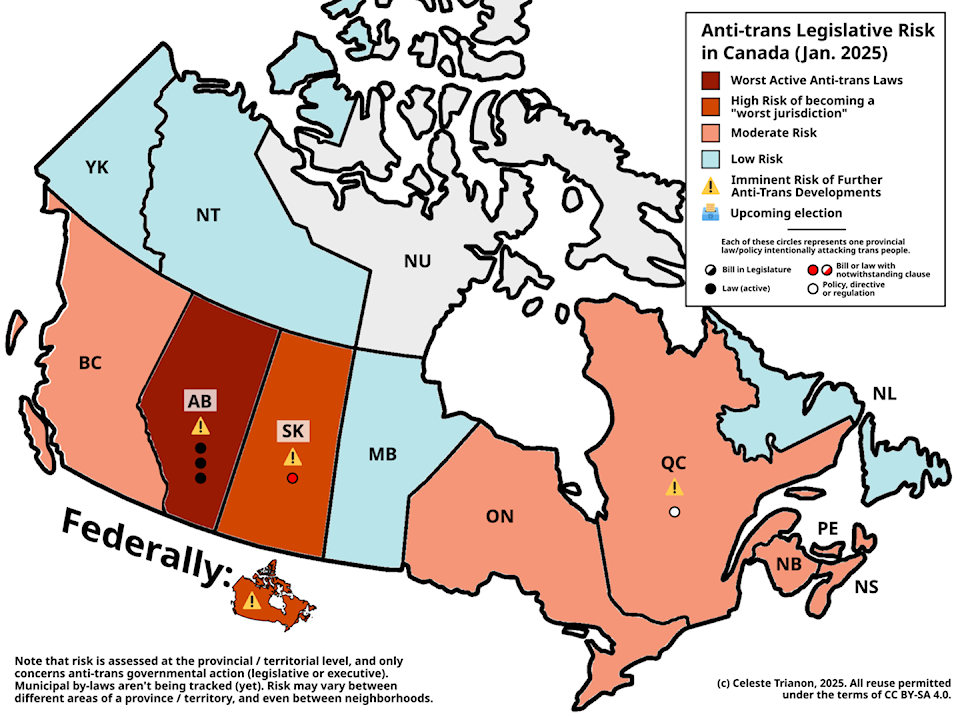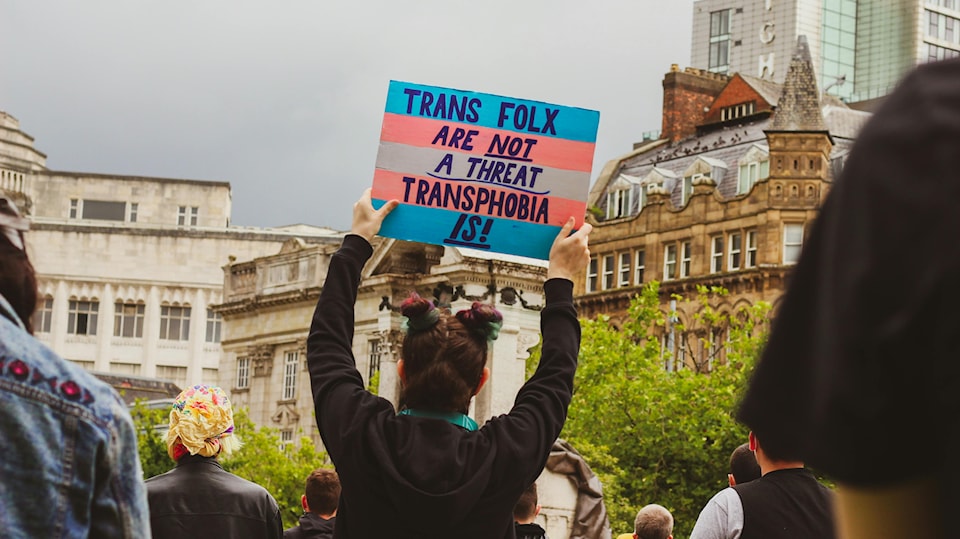As Celeste Trianon paced along the streets of Montreal, an oversized piece of bread hanging out of her bag, she reminisced about a simpler time for trans people in Quebec.
Quebec allowed the non-binary community to identify themselves on personal certificates with the “X” symbol for gender in June 2022. The transfemme activist said she remembers seeing joy and pride on people’s faces as they gallivanted along the streets with trans flags.
It was a moment of joy that Trianon said she knew wouldn't last.
“Nowadays, I’ve noticed people becoming more and more secretive, and more and more scared of being out there in public. Its people forced to be invisible, not because they want to, but because it’s the safest option for them,” she said.
According to a Statistics Canada report from 2024, the number of people who identify as transgender is tiny compared to the total population. The report indicates there are about 31,600 trans women and about 27,900 trans men in Canada, which has a population of more than 41.47 million people, or about .0014 per cent.
When combining the total population of trans men and women with the total population of cis men and women, the ratio of trans women to cis women is two to 100, whilst the ratio of trans men to cis men is one to 100.
Despite this, trans people continue to face more scrutiny than cis-gendered people. Trianon said she is one of the many trans activists who began fighting for her rights in Canada due to the rise of vitriol and violence she has seen trans people face within Canada.
As of this publication, the only official piece of legislation in Canada that protects trans rights to some degree is Bill C-16. First introduced in 2016, the bill added gender identity and expression to a list of prohibited grounds of discrimination.

Trianon’s website keeps track of provinces which currently have or could introduce anti-trans legislation.
Alberta is labelled as the worst by Trianon due to the rampant anti-trans legislation. For example, Bill 26 bans gender-affirming healthcare for trans people, but specifically targets trans youth.
The bill prevents minors from accessing gender-affirming healthcare, such as sex reassignment surgery and hormone therapy.
The bill was met with negative reception from members and supporters of the LGBTQ+ community and led to even more drastic outcomes. In Feb. 2024, the introduction of this bill led to a trans youth taking his own life.
A medical report published by the National Library of Medicine in 2022 emphasizes the need for gender-affirming healthcare to be accessible to trans youth.
The study, consisting of more than 100 trans youth aged 13 to 20 years old, found that youth who received gender-affirming care were “associated with 60 per cent lower odds of moderate or severe depression and 73 per cent lower odds of suicidality.”
Other provinces, such as Saskatchewan, are labelled as high risk by Trianon simply because of whom represents it; Pierre Poilievre.
Trianon said it would be horrible for the trans community under a Pierre Poilievre Conservative government.
“Imagine what a government which actively hates trans people could do. For example, forbidding trans people from using the bathroom and imposing criminal records on people who dare to do so,” she said.
Poilievre has been openly anti-trans within the media. In February 2024, the Conservative leader said to CBC that trans women should be banned from women’s sports, changing rooms, and bathrooms.
In the interview, Poilievre said “biological men” do not belong in women’s spaces.
Despite popular belief, cis people are not at risk of trans people. It’s the opposite. Orion Neustifter, an associate professor at the University of Guelph who specializes in LGBTQ+ issues, said trans people are attacked the most in public washrooms.
Neustifter said trans women, or even cis women who people assume are trans, are at higher risk of being attacked in public washrooms.
“We have learned to be afraid of people who break social rules. So if something or someone is new to you, you may find it creepy or don’t know what to expect,” they said.
Neustifter said the majority of the fear and outrage toward trans folk is a result of the need to oppress and control the minority.
“When folks want to target a specific group, the most effective way to do that is through fear. That means the problem is introduced to people who didn’t know there was a problem,” they said.
“And so when people are introduced to an idea as it being a risk or a danger, there's even more unlearning that has to be done to overcome that. It's a really powerful way to control populations,” they said.
Neustifter said this type of targeting is not only controlling the folks who already have that identity, but it controls the folks who are trying to discover if they have that identity.
Lin Zahrai, a trans masc student at Concordia University, said the general social and political climate pushed back his progress in discovering his true gender identity.
“I come from a Middle Eastern background, so it was difficult for me to bring the subject up [to my family],” he said.
“Politically, I still fear [being open] because of what’s going on in Canada in general. Even with my name change and stuff like that, I had to take into consideration like what’s going to happen months later on with politics and how I’m going to be perceived,” he said.
Despite choosing to go through with his sex and name change, Zahrai said there are times he is still discriminated against. As a barista, he said he has noticed when customers act weird toward him or comment about his identity.
“Sometimes I can move on from it, and sometimes it does weigh on my mental health just because it made me feel bad,” he said.
Neustifter said they want people to “follow the power”, and to use critical thinking skills about the information they receive.
“Follow the power. Who benefits and who is harmed by the information that you're receiving?” they said.
Trianon said she wants people to listen and believe trans people when they voice their concerns.
“When they say our rights are under attack, it’s because we internally know that there’s so much anti-trans hate going on. We see the hate being spread. We see people laughing at our existence, and we see people calling for trans genocide,” she said.




